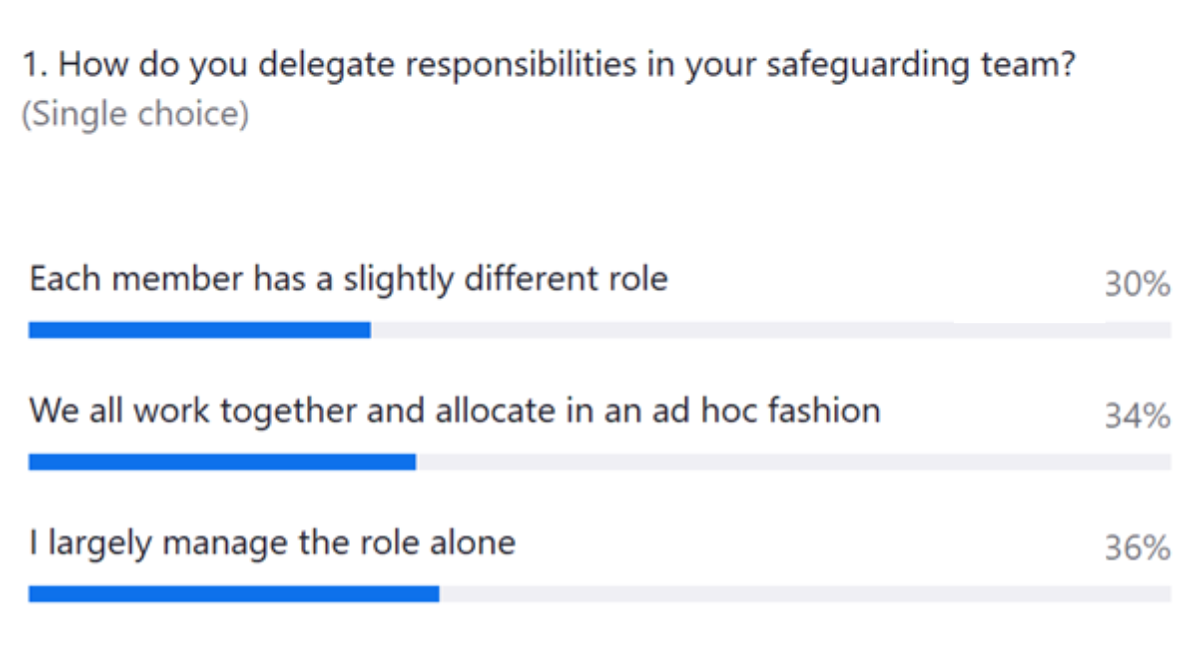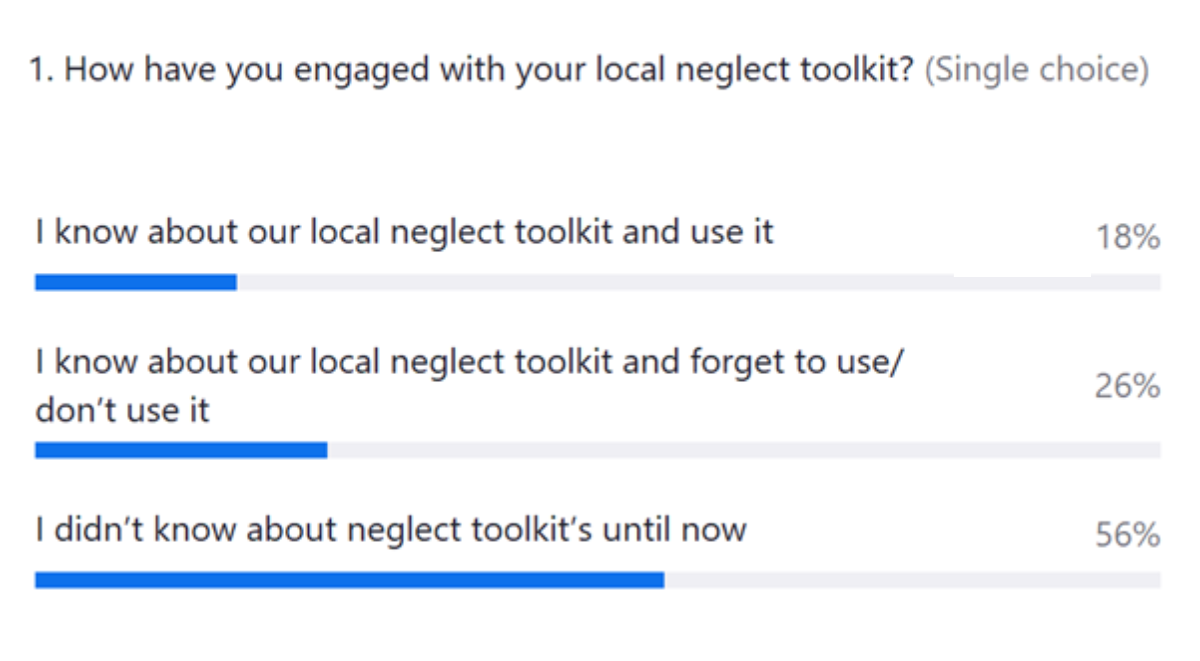Safeguarding Client Survey Uncovered - Insights from the sofa
_1000.png)
This blog is based on Judicium’s Safeguarding Client Survey Uncovered - Insights from the sofa session from 8th October with our Safeguarding Consultant Joanne Bocko. This session unpacked key themes that arose in the Safeguarding client survey 2025. Focusing on the challenges and top tips to strengthen your safeguarding culture within your education setting.
Judicium's Safeguarding Insights Survey 2025 was developed as way to understand how safeguarding was being led and experienced across schools and trusts for our clients and non-clients. The survey also touched on SEND and inclusion challenges. It’s really important for us to ensure our service and training continues to suit the needs of education and that we are able to support directly on the issues that matter.
Poll 1
.png)
Managing DSL Role and Remit
DSL role and remit showed to be the most stressful aspect of the DSL role at 56.6%.
Further results showed:
Record keeping - 37.9%
Absent pupils and alternative provision - 39.5%
Child-on-child abuse - 29.1%
Allegations of abuse made against staff - 28.2%
Policies and procedures - 21.4%
Although the DSL role is inherently stressful, DSLs were confident in how they were carrying out their role. 94% of respondents said safeguarding is embedded “extremely well” or “very well” in their setting. 85% of schools feel confident they’d perform well in an inspection, and 84% of inspected settings received positive Ofsted safeguarding feedback.
However, it was clear that by ensuring safeguarding is embedded and remains strong, DSLs are balancing high-stakes responsibilities with limited admin or supervision and often that means you’re working late and long hours which can only increase the stress and overwhelm of the role.
How your role should be supported by your deputies
From our audits, we get to see a variety of structures and ways in which safeguarding teams are set up. On the whole, safeguarding teams are getting larger with many secondaries training Heads of Year to be safeguarding leads to increase support and responsibilities for larger student cohorts. We’ve seen benefits in this approach, enabling children to open up to trusted adults they see daily, and having those in these key roles very much part of safeguarding decision making. We’ve also seen challenges in the consistency of record keeping, a difference in approaches and that larger teams can mean that not all information is shared, or overseen effectively or there can be different approaches in different teams. In smaller schools where there may be one DSL and deputy, levels of stress maybe higher with the weight of their workload and the cases they hold.
Ultimately it comes down to the schools favoured approach, but I’d encourage those who are in smaller teams who may feel stressed to share and delegate work. This also empowers deputies to gain skills and practice in their key role.
For those with larger teams, it is important to set up key processes about the recording of information, our survey suggested that while DSLs had confidence in record keeping, their confidence in colleagues was lower, suggesting an over-reliance possibly on a few individuals to get things right, or perhaps that deputies have not been provided the opportunities to engage fully in their role. What we also see commonly on CPOMS for example, some record an incident with all the actions underneath, and others keep starting a new incidents, this can make the chronology really unclear.
To support larger safeguarding teams, where work is delegated, the DSL should still maintain oversight, and the team should come together regularly to review record keeping systems, close cases and discuss vulnerable children.
Top tips for delegating tasks
Deputy/ deputies take on the lead role once a week or for an afternoon a week: This enables the DSL some administrative time, the opportunity to review cases, chase and escalate and do some of the strategic side of things. As previously suggested, this also gives the deputy the opportunity to gain confidence and manage the role if there were extending factors such as sickness.
Separate by topic: For example, one deputy is responsible for attendance, another is responsible for more of the pastoral work, and another maintains more of an administrative role, with the DSL being more strategic. As it’s the beginning of the school year, it’s a good time to reflect on what has/ hasn’t worked in the previous year and consider different ways of doing things if needed.
For Trusts, consider which delegation is working for schools: We always recognise that managing consistency as a trust can be particularly challenging across a number of schools and diverse environments. It’s hard to state that each school should run their safeguarding team in a specific way, but I think it’s something that trusts can engage their DSLs on. What models work, what’s not working, share best practice, utilise record keeping data to understand consistency and support schools to create clear procedures about how their safeguarding teams will run.
Poll 2

Lack of Support for Supervision
Another huge topic raised in the survey is the lack of support and supervision. We were surprised to find that there was no direct reference to supervision in KCSIE 2025. Our survey responses were clear that respondents understood the value of reflective supervision, yet over a third receive none at all.
Both Children's Social Care (CSC), and nurseries have to have supervision as a standard and with Working Together Guidance more closely aligning language and organisational approaches, it would stand to reason that this should be offered out more regularly to schools who are managing vast workloads, high risk cases, and trying to get their families support against ever rising thresholds. Schools are offering the majority of early help support and it is completely understandable that you are feeling the strain.
Although not mandatory, from our perspective, supervision is a great opportunity to share concerns, vent if needed, and for us to support supervisees to find a way forward, or a sense of peace in a role with mounting pressure. It’s an opportunity to sense check, receive validation that you’ve done as much as you can and is just an hour for yourself, no interruptions, and focus on key cases. Without supervision there can be risk of burnout, poor decision making, or blockages that feel insurmountable and that only impacts on the stress of the role.
We believe in supporting teams in different ways, which is why we offer one-to-one and group supervision as a chance for DSLs to reflect and destress from their busy day-to-day lives. The benefits of outsourcing your supervision? A dedicated education focused supervisor who is impartial and can aid solution focused thinking. Find out more about our supervision service here.
Challenges with Multi-agency Working
The survey indicated that many schools feel left to “hold the child” due to LA thresholds, funding cuts, and partnerships that aren’t always responsive to schools and DSLs feeling somewhat left out of multi-agency working and arrangements. This is largely due to being a ‘relevant agency’ rather than one of the key partners. We know some local authorities are working hard to try and involve education in a much more meaningful way within multi-agency arrangements but there isn’t a consistent approach. For those of you working across multiple LA’s, I’m sure there are additional challenges here, and you may be aware of a ‘postcode lottery’ when it comes to support, interactions and information sharing.
For us to consider multi-agency relationships more carefully, this is where we change tact from KCSIE and focus in a little more on Working Together to Safeguard Children. This document outlines how key agencies should work together and will provide you with support to escalate where required.
Starting with timescales, children's social care should acknowledge receipt of any referral within 1 working day. Now most CSC will now send an automated response to satisfy this criteria, if they don’t, you would be within your right to chase confirmation within one working day.
Things to consider why your referral has not been accepted
- Has it met the threshold criteria? Have you used language from the threshold guidance to support your referral?
- Ensure your language is hitting many points for a S47.
- Do you have clear evidence to escalate your concern? Have you evidenced the voice of the child and impact?
- Is there a lot of extraneous information that masks the key concerns you have?
Example: Ongoing neglect, you might highlight dirty clothing, persistent headlice and a lack of food, but what is the impact on the child? They may be bullied for their unkempt appearance, struggle with their self-esteem, they may no longer wish to attend school. They may have also lost weight or not have the energy to join in lessons or play. This information is vital for CSC to understand what you see and why you’re concerned beyond the headlines.
To support any referral for neglect, you should also utilise your local neglect toolkit. This is a document and set of resources used by a professional to identify, assess and respond to child neglect within a specific geographical area, such as borough or city council.
These vary from LA to LA but ultimately are a threshold guide centring on neglect alone. Sections include consideration for food, housing, clothing, animals, hygiene, sleeping arrangements, supervision, care by adults, traffic awareness and car safety. This provides us with a clear guide to centre our thoughts and concerns when making a referral in this area.
Poll 3

Children's Social Care - Collaborative Professional Conversation
Sometimes emails don’t always come out in the way we intend, or they clearly express some frustrations. We recommend, where possible, get on the phone, talk person to person. Realise you’re both human and come together to discuss your concerns about a child and have a collaborative, professional conversation.
Some CSC allow DSLs to sit-in and shadow for a day. Those that have had this opportunity have reported a greater working relationship with their social care colleagues.
Escalation
This can also be referred to management of professional disagreements. These clearly outline the procedures to follow to escalate and evidencing. It is important to include each stage of escalation within record keeping.
Relationships with Parents
This was prominent when asking schools to comment on new and emerging concerns they saw in their setting or MAT. This is often also flagged in supervision, including parental mental health and links to children’s attendance.
Top tips to manage relationships with parents
- Explain your responsibilities with safeguarding nice and early and to all parents. This allows less chance of being blindsided and cause anxiety.
- Make the parents aware of school policies, considering information promoted on the school website, useful links and website resources like Internet Matters, Education Against Hate.
- Promote how your school supports families with filling in forms, domestic abuse and parenting classes.
- Highlight the responsibilities you do. For example, raise FGM concerns, your responsibilities under the Prevent duty, and perhaps even around parental separation which can be contentious.
Managing difficult relationships
Managing negative relationships can be tricky. Ensure all parents are engaged with positive aspects of their child’s progress and behaviour before discussing concerns and celebrate the little wins. You should also consider how to create low-pressure opportunities to connect, including informal events such as coffee mornings, open classrooms, community walks.
When formal meetings are needed, creating a welcoming, trauma-informed space for parents can make a big difference. Empowering parents means involving them in meaningful ways—asking for feedback, offering small volunteer roles, and making them feel part of the school community. Greet them with empathy and remember that anxiety, fear, or past experiences with children’s services may shape their reactions. Consider how your school website can gently guide them to support, even if they're not ready to speak up.
Communication matters too—use a mix of channels like texts, ClassDojo, emails, or handwritten notes, and keep language simple and accessible. For secondary schools, where face-to-face contact is limited, look for connection points at events, through surveys, or parent groups. Relationships take time, but every small effort builds trust.
Parental mental health
DSLs are expressing big issues with parental mental health. Supporting parental mental health—especially when parents are hesitant to engage—requires a sensitive, proactive, and inclusive approach. Schools can play a vital role in creating a supportive environment that indirectly nurtures parents' wellbeing, even if they’re not actively participating.
You might consider sending mental health resources to ALL parents, therefore no parent feels ‘picked’ on, but all have access to vital information and support. We can also support our young people with emotional literacy and resilience which can influence the home environment. You might consider setting wellbeing homework for children to engage with their parents or invite parents in for a mental health day or wellbeing event. This could be in conjunction with community partners or family-friendly activities like yoga, art therapy, or nature walks. There’s a big push on feelings of ‘belonging’ that impacts young people’s attendance and mental health, but the same can be said for parents.
Thinking of the ways to wellbeing: giving, connecting, learning something new, being active and taking notice.
Don't Miss Our Safeguarding Conference!
Our sofa session only touched on some of the pain points from our Safeguarding Client Survey 2025. Join us on the 21st November where we will be looking at:
Keynote - Evolving practice alongside evolving technologies: Considerations for online safety
Then choose from one of the four seminars:
- Inclusive safeguarding practice (SEND focus)
- Engaging effectively with multi-agency partners
- What does good record keeping look like?
- Addressing challenges when managing safeguarding across Multi-Academy Trusts (MATs)
Keynote: Building Belonging: The Key to Improving School Attendance
Then choose from one of the four seminars:
- Managing the impact of parental separation
- Safeguarding Against Sextortion: Awareness, Prevention, and Response
- Allegations Against Staff: Ensuring Safe and Fair Practice in Schools
- Safeguarding culture in EYFS: A child centred approach
Keynote: Managing Stress in Safeguarding: Simple Strategies That Work
How Judicium Education can help...
If this raises questions for your setting, you’re not alone. Our full Judicium Safeguarding service includes annual audits, unlimited advice, free training and a space for your DSL to feel confident and supported.
If you require any support in any of these steps or would like to talk to someone surrounding some support for your school, please do not hesitate to call us on 0345 548 7000 or email enquiries@Judicium.com
Additional Information
To view all upcoming Safeguarding courses, dates and links click HERE.
To view all upcoming HR courses, dates and links click HERE.
Safeguarding eLearning Courses
Judicium Education’s Safeguarding Service is intended to assist schools in meeting the statutory requirements and guidance for schools and colleges on safeguarding children and safer recruitment. For more information, please visit here.
You can follow us on Twitter: @JudiciumSG @JudiciumEDU
If you’d like to review Judicium’s forthcoming sofa sessions please click here
© This content is the exclusive property of Judicium Education. The works are intended to provide an overview of the sofa session you attend and/or to be a learning aid to assist you and your school. However, any redistribution or reproduction of part or all of the contents in any form is prohibited. You may not, except with our express written permission, distribute or exploit the content. Failure to follow this guidance may result in Judicium either preventing you with access to our sessions and/or follow up content.
Related content

This blog is based on Judicium’s Safeguarding ‘Sofa Session’ from the 4th February 2026, with our resident experts Joanne Bocko and Sarah Cook.
.png)
This is a summary from Judicium’s Safeguarding and Thrive ‘Sofa Session’ from 3rd December, with our Judicium Safeguarding consultant Joanne Bocko, Thrive Head of Innovation and Principal Trainer, Viv Trask-Hall and Director of Thrive, Tom Preston. Drawing on decades of combined experience in safeguarding, governance, SEND, leadership, and mental health, the panel unpacked how the framework’s shifts will impact schools, what Ofsted will be looking for, and how leaders can position themselves for success.

This is a summary taken from Judicium’s SEND and Safeguarding ‘Sofa Session’ from 5th November, with our Safeguarding and SEND consultants Rik Chilvers and Simon Hanley. In this session we discuss the new SEND and Safeguarding toolkit and how to best prepare for an Ofsted visit.
.png)
This blog is based on Judicium’s Safeguarding - Back to school: Are you KCSIE ready? sofa session from 10th September with our Head of safeguarding, Kate Massey . In this session we take a look at the key updates for KCSIE 2025, and how best to prepare for the start of the new academic year.

This blog is based on Judicium’s Safeguarding Supervision On The Sofa: Your DSLs Safe Space ‘Sofa Session’ from the 25th June 2025, with our resident experts Helen King and Sarah Cook.
).png)
Supervision is dedicated time for professionals to reflect openly on the challenges of the cases they manage. This blog explores the common misconceptions, myths and the all important benefits to Safeguarding Supervision. Don't miss our Safeguarding Sofa Session on Supervision: Your DSLs safe space on 25th June at 10am OR 11:30am.


Sofa Sessions | Safeguarding